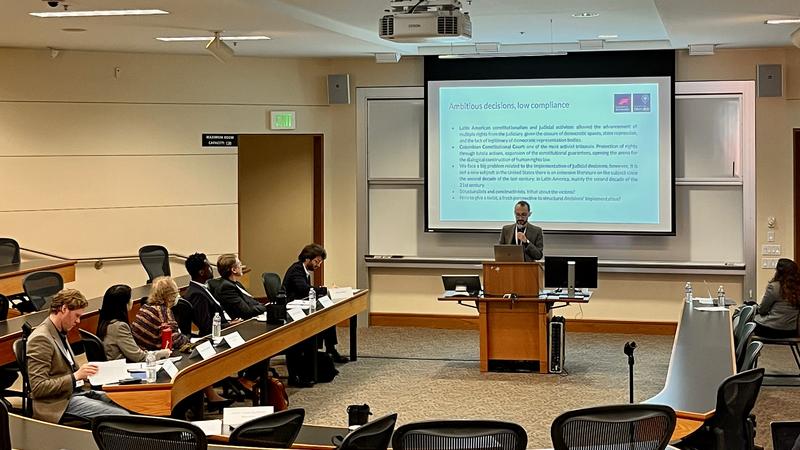Where do your research interests lie?
My research lies within social movement studies and the legal mobilisation of indigenous peoples in Latin America, particularly in how they fight for social justice before the courts and the strategic decision-making process to bring the promises of structural human rights decisions to reality.
Through a multi-layered ethnography, my thesis seeks to understand how the Wayúu indigenous movement in the Colombian Guajira region makes strategic decisions for collective action before the Constitutional Court of Colombia and why they reframe their discourse on human rights to confront the non-compliance of the State with a historic human rights ruling from 2017.
Thus, through the voices of its protagonists, I seek to understand, at a micro-sociological level, the indigenous movement's strategic decision-making process and its pursuit of ethnic and social justice.

Julián presents his research at Stanford University
Has any of your research been published?
I would like to highlight the work we did at Dejusticia. In 2023, I led the writing of a book titled Territorio Wayúu: entre distancias y ausencias, on the relationship between drinking water, food, and geographic distribution of inequality in Wayúu schools in La Guajira, Colombia.
Who is your academic hero?
The first is Rodrigo Uprimny, the most salient Colombian constitutionalist, university professor, and absolute genius of law and social justice in Colombia. From him, I learned about the academic work committed to social transformation.
The second is my supervisor, Leigh Payne, whom I admire for her passion and commitment to thinking "from below," from the Global South, but always with a global, sociological perspective.
What do you hope to do when you finish your course?
I want to continue working between academia and social activism and, from there, think about my next big academic project for the DPhil, which will surely come in a few years. I will definitely go back to Latin America in the short term to engage in more experience from the social movement.
What piece of advice would you give to prospective students?
I would suggest contacting previous students via the Department or social media.
Oxford is a vibrant community where there is always something going on - to get the whole experience, it's better to have as many conversations as possible before coming here.